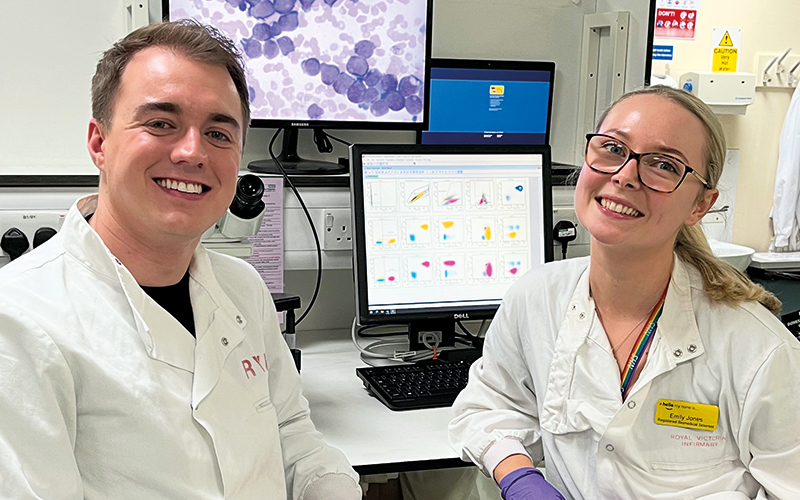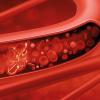Jaxon Moran and Emily Jones give a guided tour of the Flow Cytometry Laboratory at Newcastle upon Tyne Hospitals NHS Foundation Trust.

We are registered biomedical scientists employed at the Newcastle upon Tyne Hospitals NHS Foundation Trust. Upon graduating from Northumbria University, we were both lucky enough to secure trainee biomedical scientist positions in the Flow Cytometry Laboratory (Flow Lab) – a first for the department. The lab is located at the Royal Victoria Infirmary (RVI), along with the Great North Children’s Hospital (GNCH), and specialises in assays vital for the diagnosis, treatment and monitoring of haematological malignancies and immunodeficiencies in both adult and paediatric patients.
Flow cytometry is a technique used to analyse the physical and chemical characteristics of cells. Samples are incubated with fluorescent compounds and suspended in a fluid. This technique allows for rapid immunophenotyping of cells found in the peripheral blood, liquid bone marrow and other fluid samples. It is used to detect abnormal cancer cells or to identify an immunodeficiency.
Flow cytometry at the RVI is split into two disciplines – haematology and immunology. The proficiency in haematology-related flow cytometry integrates with the expertise of cytogenetics, molecular genetics and cellular pathology to support the Northern England Haemato-Oncology Diagnostic Service (NEHODS). This tight integration aims to improve outcomes for patients in northern England by providing cost-effective and timely results for the diagnosis, prognostication and monitoring of haematological malignancies.
Of the haematological assays that are not covered through NEHODS, we aid in the diagnosis and monitoring of conditions, such as paroxysmal nocturnal haemoglobinuria and hereditary spherocytosis.
Additionally, the Flow Lab provides monitoring for patients with immunological conditions, such as HIV and inborn errors of immunity. The GNCH facilitates the testing and monitoring of around 1400 children per year with suspected immunodeficiency. Diagnoses are supported using flow cytometry by detecting the presence and function of immune cells required in fighting off opportunistic infection.
As well as this, Newcastle Hospitals is one of two centres in the UK that specialise in haematopoietic stem cell transplants for patients with an immunodeficiency or a haematological malignancy. Our laboratory has a close relationship with Newcastle Advanced Therapies, receiving and processing over 300 patient transplants every year, performing a range of specialist procedures, such as TCRαβ+, CD19+ depletions and CD45RA+ depletions where flow cytometry is required to provide highly accurate and precise counts.
Due to the highly specialised nature of the section, we were supported in our decision to undertake the IBMS Diploma of Specialist Practice. Emily’s project was surrounding the role of flow cytometry in the patient care pathway of severe combined immunodeficiency (SCID). This involved extensive validation of two assays not currently offered at Newcastle Hospitals that would be useful in the diagnosis of two specific types of SCID. Jaxon’s project was the development and implementation of a measurable residual disease assay by flow cytometry in the diagnosis of patients with acute myeloid leukaemia. These research projects allowed us to display the specialist knowledge we have gained over the years, while also advancing our knowledge of flow cytometry, benefiting the department, patients and service users.




